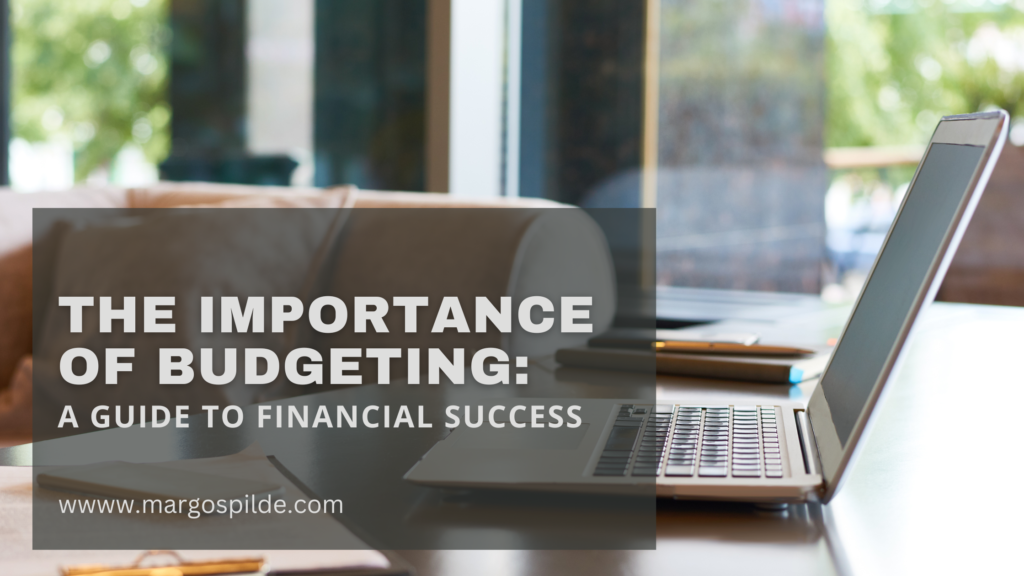Are you tired of being stressed about your finances? Are you ready to take control of your money and live the life you want? If so, it’s time to start budgeting! Budgeting is the foundation for financial success, giving you clarity and control over your income and expenses. In this post, we’ll guide you through the important reasons why budgeting matters and provide practical tips to get started on the path toward financial freedom. Get ready to transform your relationship with money – let’s dive in!
Introduction: What is Budgeting and Why Is It Important?
Budgeting is the process of planning and allocating your financial resources to achieve your desired outcomes. It involves setting goals, estimating expenses, and tracking progress over time.
Why is budgeting important? Budgeting is a critical tool for achieving financial success. By creating and following a budget, you can make informed choices about how to best use your money to reach your goals. Budgeting can help you avoid debt, save for future goals, and manage your day-to-day finances.
Creating a budget may seem daunting, but it doesn’t have to be complicated. Start by evaluating your income and expenses, and then determine what changes you need to make to improve your financial situation. Be sure to revisit your budget regularly and make adjustments as needed. With a little effort and planning, you can take control of your finances and set yourself up for a bright future.
How to Set Up a Budget
Setting up a budget may seem daunting, but it doesn’t have to be! By following these simple steps, you can be on your way to financial success.
1. Determine your income. This includes money from your job, investments, and any other sources.
2. Figure out your expenses. Make a list of all of your fixed expenses, like rent or mortgage payments, and variable expenses, like groceries or entertainment.
3. Track your spending. For a month or two, keep track of every penny you spend in a notebook or spreadsheet. This will help you get an idea of where your money goes and where you can cut back.
4. Create your budget. Once you know how much money you have coming in and going out, you can start creating your budget. Begin by allocating funds for essential expenses like housing and food, and then add in amounts for savings and debt repayment. Include some room for fun spending!
5. Stick to it! The most important part of budgeting is sticking to it. Review your budget regularly and make adjustments as needed. If you find yourself falling off the wagon, don’t give up – just get back on track and keep moving toward your financial goals!
Assessing Your Day-to-Day Spending Habits
If you want to get a handle on your finances, it is important to assess your spending habits. This can be a difficult task, but it is worth it to find out where your money is going.
One way to assess your spending habits is to track your expenses for one month. This can be done by using a budgeting app or by simply writing down all of your purchases in a notebook. At the end of the month, look at your expenses and see where most of your money is going.
Are you spending too much on eating out? Are you buying unnecessary items? Once you know where your money is going, you can start to make changes to your spending habits.
Another way to assess your spending habits is to keep a diary of all of your purchases for one week. At the end of the week, review your entries and identify any patterns. Do you tend to spend more when you are bored? When you are stressed? Tracking your spending patterns can help you figure out what triggers your bad spending habits so that you can avoid them in the future.
No matter how you choose to assess your spending habits, the important thing is that you take actionable steps to improve them. Knowing where your money is going is a good first step toward financial success!
You may also learn more about “How to make the most of your money – A beginner’s guide to saving“.
Strategies for Cutting Expenses
When it comes to budgeting, one of the most important things you can do is find ways to cut expenses. This can be difficult, especially if you have a lot of expenses, but it is possible. Here are some strategies for cutting expenses:
1. Track your spending. This is the first step to finding areas where you can cut back. Write down everything you spend money on for a month, and then look at where most of your money goes. This will help you identify areas where you can save.
2. Cut out unnecessary expenses. Once you know where your money is going, start cutting out unnecessary expenses. This may include things like entertainment, dining out, and shopping trips that aren’t essential.
3. Find cheaper alternatives. For essential expenses, see if there are cheaper alternatives that still meet your needs. For example, if you’re paying for a gym membership that you don’t use often, consider canceling it and working out at home instead.
4. Save money on groceries. Groceries are one of the biggest household expenses for many people. There are a few different ways to save on groceries: buy in bulk when items are on sale, shop at discount grocers, or grow your food (if space permits).
5. Save on transportation costs. If you have a car, try to save on gasoline by carpooling or taking public transportation when possible.
Investing Wisely
Investing wisely is one of the most important aspects of budgeting for financial success. Investing in assets that will grow over time, such as stocks, mutual funds, and real estate is important. These types of investments can provide a nest egg for retirement or other long-term financial goals. It is also important to diversify one’s investments so that not all of the eggs are in one basket. This means investing in different types of assets, such as bonds and stocks, to offset any potential losses in one area.
Ways to Save Money
If you want to be successful with your finances, budgeting is the key. But even if you are the most disciplined person when it comes to spending, there are other ways to save money. Here are a few tips:
1. Get organized and track your spending. This will help you identify places where you can cut back or make changes.
2. Live below your means. Don’t try to keep up with the Joneses – they might be in debt! Focus on what’s important to you and what makes you happy.
3. Make a plan for your debts and expenses. Having a timeline and goal for debt payoff will help motivate you to stay on track.
4. Automate your savings. Set up automatic transfers from your checking account to your savings account so that you’re automatically making progress toward your financial goals.
5. Invest in yourself. Take some time to learn about personal finance and investing. The more knowledgeable you are, the better decisions you can make with your money.
Dealing with Financial Emergencies
It’s no secret that a financial emergency can happen to anyone at any time. Whether it’s a job loss, an unexpected medical bill, or a natural disaster, these situations can throw even the most prepared person into a loop. That’s why it’s so important to have a budget in place before an emergency strikes.
A budget is a roadmap for your finances that tells you where your money is going and how much you have to spend on each expense. It can help you stay on track with your spending and save money for unexpected bills or emergencies.
Creating a budget may seem like a daunting task, but there are plenty of resources available to help you get started. You can use online tools, like Mint or Personal Capital, to track your spending and create a budget plan. Or, if you prefer the old-fashioned way, you can use pen and paper to track your expenses and income.
Once you’ve created a budget, stick to it as best as you can. When an emergency does occur, dip into your savings account to cover the costs instead of using credit cards or taking out loans. This will help you avoid getting into debt and will allow you to pay off the debt quickly once the situation has stabilized.
No one likes dealing with financial emergencies, but they are a fact of life. By being prepared with a budget, you can make sure that these situations don’t throw your finances off course.
Conclusion
Budgeting is an essential part of financial success and it’s important to make sure that you understand the basics. By setting a budget, tracking your expenses, and understanding how financial decisions affect your finances in the long term, you can create a secure financial future for yourself. With wise budgeting habits, any individual or family can enjoy the benefits of being financially successful. So why not start taking steps towards making smarter money management decisions today?
Like this Blog so far? I’d love to hear your comments..


